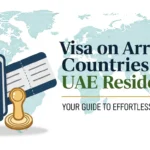Introduction
The United Arab Emirates (UAE) is a global melting pot, home to tens of millions of residents and expatriates who make contributions to its vibrant economy and dynamic lifestyle. As one of the most sought-after destinations for experts, traders, and travelers, the UAE continuously updates its journey and residency policies to align with its vision of being a worldwide hub for innovation, commercial enterprise, and way of life. Recent adjustments to these guidelines replicate the UAE’s commitment to maintaining its popularity as an international-class destination while addressing the evolving desires of its various populace
Travel Policy for UAE Residents
Residency Visa Cancellation for Extended Absences
The UAE has strict policies regarding residency visa validity, particularly when residents spend extended periods outside the country. The six-month absence rule is a key regulation that all UAE residents must adhere to to maintain their legal residency status.
Six-Month Rule
Under UAE immigration law, residents keeping legitimate residency visas have to now not continue to be out of doors for more than six consecutive months. This rule guarantees that residents keep an energetic connection to the UAE and discourages prolonged absences that would indicate a loss of ties to the country. This rule applies to all citizens, which includes people with employment visas, family sponsorships, and other types of residency permits.
Consequences of Exceeding the Limit
Once a resident exceeds the six-month restriction, their residency visa is canceled automatically. This means they lose their legal right to live and work inside the UAE. Residents whose visas are canceled because of prolonged absences will no longer be allowed to re-enter the UAE without acquiring a brand-new visa.
Visa Cancellation due to Excceding the limit
Exceptions
Certain residents might also qualify for exceptions from the six-month rule. These consist of students pursuing education in other countries, residents who have gone abroad for medical treatments, Individuals running for UAE-primarily based companies but stationed abroad for reputable functions, and Exceptions may be granted for humanitarian motives or unforeseen emergencies, however, those are considered on a case-through-case foundation.

Re-Entry Permit for UAE Residents
The UAE government presents a Re-Entry Permit for citizens who’ve accidentally surpassed the six-month absence restriction required to maintain their residency visa. A Re-Entry Permit is a special authorization granted employing UAE immigration government that allows residents to re-input the UAE after exceeding the six-month absence rule.
Eligibility for a Re-Entry Permit
To qualify for a Re-Entry Permit, applicants need to meet particular conditions and provide valid motives for their extended absence. Common eligibility situations encompass citizens who have been unable to return due to hospitalization, medical remedy, or health-associated emergencies abroad, college students pursuing higher training overseas, citizens who had to continue to be overseas to deal with non-public emergencies, and employees operating for UAE-primarily based companies.
Application Process
Apply online via the Federal Authority for Identity, Citizenship, Customs, and Ports Security (ICP) portal or visit a registered typing middle. Applications can also be initiated through immigration offices or authorized provider facilities in the UAE. Applicants must submit
- A valid passport with at least six months of validity.
- A copy of the canceled residency visa or Emirates ID.
- Evidence supporting the reason for the extended absence (e.g., medical reports, enrollment letters, or work assignments).
Re-entry permits involve a processing fee, which varies depending on the applicant’s case. Approval may take a few days to weeks, depending on the complexity of the case.
Read This Article: ULTIMATE Guide to Budget Travel From Uae
Travel Policies for Dependents
The UAE offers well-defined travel policies for dependents of residents, ensuring families can live, travel, and reunite smoothly within the country. Dependents, such as spouses, children, and in some cases, parents, are typically sponsored by the primary visa holder. Their travel policies are closely tied to the sponsor’s residency status, emphasizing the importance of maintaining valid documents and adhering to UAE immigration regulations.
Residency Visa and Sponsorship
Dependents require a valid residency visa to live in the UAE, typically sponsored by the family’s primary resident, such as a working spouse or parent. Travel policies mandate that dependents’ visas remain valid for re-entry into the UAE after international travel. If a dependent’s visa expires while they are outside the country, they may face re-entry restrictions, making it essential to renew visas before traveling.
Extended Absences and Re-entry Rules
Similar to residents, dependents must adhere to the UAE’s six-month absence rule, which requires them to return to the UAE within six months of leaving to maintain their residency status. Exceptions may be granted in cases such as studying abroad or medical emergencies, provided sufficient documentation is submitted. Additionally, dependents under sponsorship must exit the country if the sponsor’s residency visa is canceled.
New Visa Categories for Residents
The UAE has introduced several new visa categories a diverse pool of residents, professionals, and investors. These new visa types align with the UAE’s strategic vision to become a global hub for talent and innovation while catering to the varying needs of its growing expatriate population.
Green and Golden Visa
Among the most notable additions are the Green Visa and Golden Visa. The Green Visa is particularly designed for freelancers, skilled professionals, and investors, providing residency for up to five years. In contrast, the Golden Visa offers a 10-year residency for investors, entrepreneurs, exceptional talents, and individuals in high-demand sectors such as healthcare and technology.
UAE Golden Visa
Job Exploration Visa
Another significant development is the Job Exploration Visa, which allows skilled professionals and recent graduates to explore job opportunities in the UAE without requiring a sponsor or employment contract. Additionally, the Retirement Visa enables retirees over 55 years old to settle in the UAE, provided they meet specific financial criteria. These new visa categories reflect the UAE’s commitment to fostering a dynamic and inclusive environment for residents.
UAE Travel Policy Updates for Expats
In recent years, the UAE has introduced several key updates to its travel policies, particularly aimed at expatriates. These changes are designed to make travel more flexible, convenient, and aligned with the UAE’s long-term goals of attracting global talent, enhancing its economy, and ensuring smooth residency transitions for expatriates. The updates reflect the country’s evolving approach to immigration, residency, and travel, offering expats greater ease in navigating their stay in the UAE.
Residency Visa Renewals
A UAE residency visa is a permit that lets overseas nationals stay in the UAE for a prolonged period. Renewing a residency visa in the UAE is an important procedure that ensures residents can maintain to lives, paintings, or studies in the United States of America with no legal interruptions. Residents ought to renew their visas before it expires to keep away from fines and felony headaches.
Residency Visa
Eligibility for Renewal
Residency visa renewal is contingent upon meeting specific eligibility criteria, including The resident’s passport must have at least six months of validity at the time of renewal, Emirates ID, Health Insurance, and Continued Sponsorship. The resident must not have any outstanding fines, legal cases, or violations that could hinder the renewal process.
Residency and Re-Entry Rules
One of the most significant updates affecting expats is the introduction of the six-month absence rule for residents. Expats holding a UAE residency visa must not remain outside the country for more than six months, as this will result in the automatic cancellation of their visa. However, the UAE has introduced exceptions for specific cases, such as students or individuals undergoing medical treatment. For those who exceed the six-month limit, the Re-Entry Permit allows expats to return to the UAE without losing their residency status, provided they can justify their extended absence.
Visa Flexibility and Long-Term Residency Options
The UAE has also introduced several new visa categories aimed at offering expats more flexibility. The Green Visa and Golden Visa are two key additions that allow skilled professionals, investors, and entrepreneurs to live and work in the UAE without the need for employer sponsorship. These new visa categories are particularly beneficial for expats looking for long-term settlement in the country.
Travel and Entry Requirements
For expats traveling to the UAE, it is essential to stay informed about the latest entry requirements, particularly in light of the ongoing changes to global travel regulations. While the UAE has relaxed many of its COVID-19-related restrictions, expats must still adhere to health and safety protocols, such as testing and quarantine requirements, depending on their travel history and vaccination status. Additionally, expats should ensure that their residency visas, Emirates IDs, and passports are up to date to avoid any travel disruptions.
Travel Insurance
Travel insurance is a vital aspect of planning a trip, providing financial protection against unforeseen circumstances that may arise during your journey. It typically covers unexpected medical emergencies, trip cancellations or interruptions, lost or stolen luggage, and travel delays. With travel insurance, you can enjoy your trip with peace of mind, knowing that you’re protected against unexpected events that could ruin your travel plans.
FAQ’s
What travel documents do I need to carry as a UAE resident or expat?
You’ll need to carry your passport, UAE residence visa, and any required visas for your destination country.
Do I need to register with the UAE authorities before traveling abroad?
Yes, UAE residents and expats are required to register with the UAE’s Ministry of Foreign Affairs and International Cooperation before traveling abroad.
Do UAE residents and expats need a visa to travel to certain countries?
Yes, UAE residents and expats may need a visa to travel to certain countries, depending on their nationality and destination.
Are there any emergency assistance services available for UAE residents and expats?
Yes, some UAE banks and insurance providers offer emergency assistance services, such as emergency medical evacuation and travel assistance.
How can I ensure a smooth immigration process when traveling abroad?
Make sure your passport is valid for at least six months, and that you have all required visas and travel documents.









